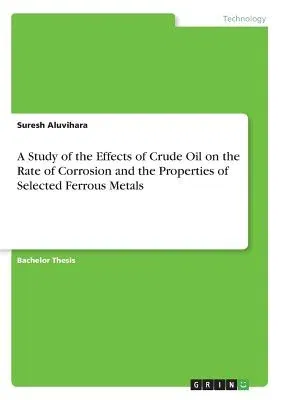Bachelor Thesis from the year 2017 in the subject Engineering - Metal
Engineering, Metal Processing, Metal Structure, grade: -, language:
English, abstract: In the industry of crude oil refining, can be found
wide range of applications of ferrous metals such as in the storage and
transportation. The corrosion is a kind of major problem faced in the
usage of such ferrous metals. The formation of the oxides, sulfides,
hydroxides or the compound related to the carboxylic group on the
surface of metal due to the chemical reaction between metals and
surrounding are known as the corrosion which is highly depended on the
sulfur content, salt content, mercaptans content and the acidity of
crude oil as well as the chemical composition of ferrous metals. In the
current research it was expected to investigate the effect of Murban and
Das blend crude oils on the rate of corrosion of seven different ferrous
metals which are used in the crude oil refining industry and also
expected to investigate the change in hardness of each metal due to the
corrosion. The sulfur content, acidity and salt content of each crude
oil were determined. A series of similar pieces of seven different types
of ferrous metals were immersed in each crude oil separately for 15, 30
and 45 days. Their rate of corrosion was determined by using their
relative weight loss after these time periods. The corroded metal
surfaces were observed under the microscope. The hardness of each metal
piece was tested before the immersion in crude oil and after the
corrosion with the aid of Vicker's hardness tester. It was found that
blend crude oil contains higher sulfur content and acidity than Murban
crude oil. Carbon steel metal pieces show the highest corrosion rates
whereas the stainless steel metal pieces show the least corrosion rates
in both crude oils. The mild steel piece and the Monel piece show
relatively intermediate corrosion rates compared to the other types of
ferrous metal pieces in both crude oils. It


